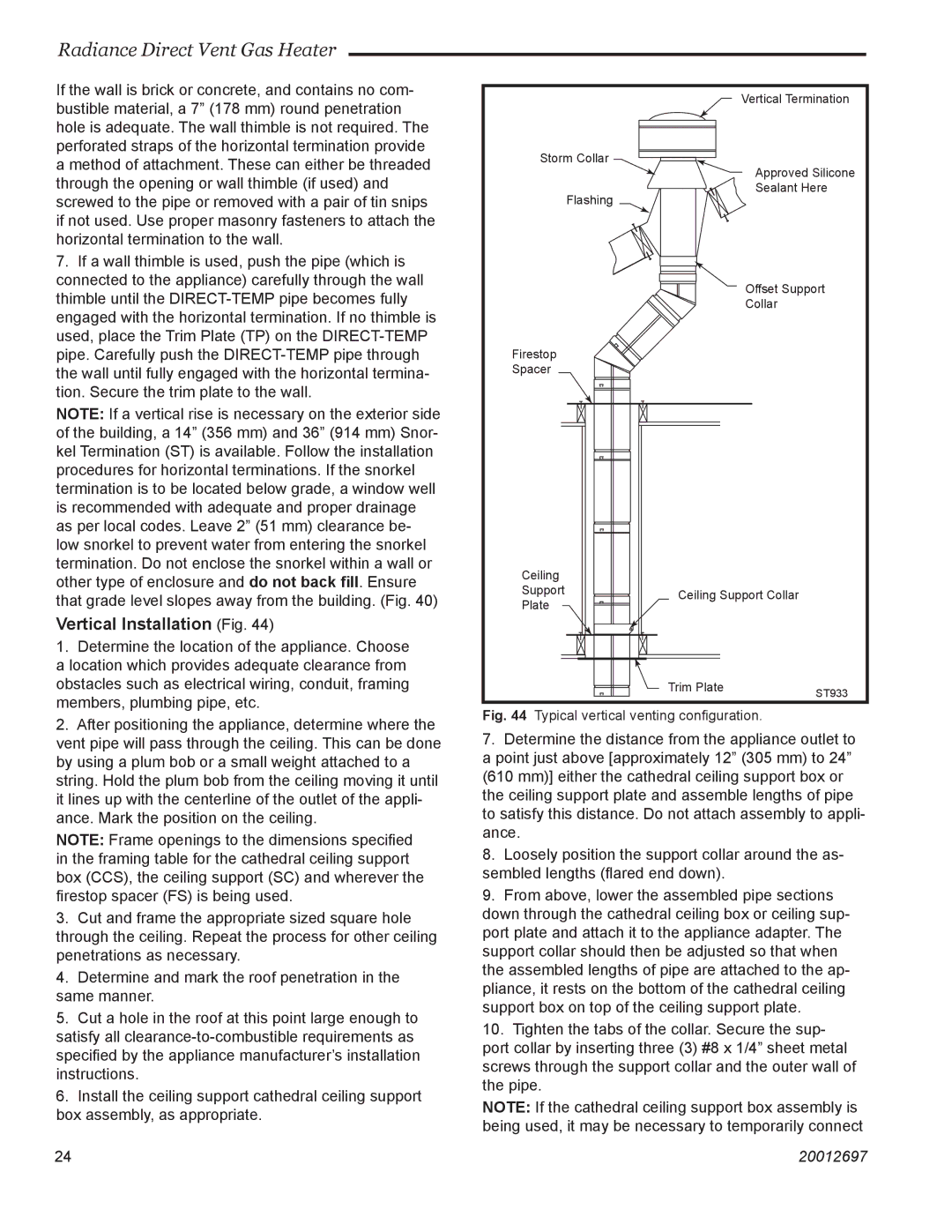
Radiance Direct Vent Gas Heater
If the wall is brick or concrete, and contains no com- bustible material, a 7” (178 mm) round penetration hole is adequate. The wall thimble is not required. The perforated straps of the horizontal termination provide a method of attachment. These can either be threaded through the opening or wall thimble (if used) and screwed to the pipe or removed with a pair of tin snips if not used. Use proper masonry fasteners to attach the horizontal termination to the wall.
7.If a wall thimble is used, push the pipe (which is connected to the appliance) carefully through the wall thimble until the
NOTE: If a vertical rise is necessary on the exterior side of the building, a 14” (356 mm) and 36” (914 mm) Snor- kel Termination (ST) is available. Follow the installation procedures for horizontal terminations. If the snorkel termination is to be located below grade, a window well is recommended with adequate and proper drainage as per local codes. Leave 2” (51 mm) clearance be- low snorkel to prevent water from entering the snorkel termination. Do not enclose the snorkel within a wall or other type of enclosure and do not back fill. Ensure that grade level slopes away from the building. (Fig. 40)
Vertical Installation (Fig. 44)
1.Determine the location of the appliance. Choose a location which provides adequate clearance from obstacles such as electrical wiring, conduit, framing members, plumbing pipe, etc.
2.After positioning the appliance, determine where the vent pipe will pass through the ceiling. This can be done by using a plum bob or a small weight attached to a string. Hold the plum bob from the ceiling moving it until it lines up with the centerline of the outlet of the appli- ance. Mark the position on the ceiling.
NOTE: Frame openings to the dimensions specified in the framing table for the cathedral ceiling support box (CCS), the ceiling support (SC) and wherever the firestop spacer (FS) is being used.
3.Cut and frame the appropriate sized square hole through the ceiling. Repeat the process for other ceiling penetrations as necessary.
4.Determine and mark the roof penetration in the same manner.
5.Cut a hole in the roof at this point large enough to satisfy all
6.Install the ceiling support cathedral ceiling support box assembly, as appropriate.
Vertical Termination
Storm Collar
Approved Silicone
Sealant Here
Flashing
Offset Support
Collar
Firestop
Spacer
Ceiling |
| |
Support | Ceiling Support Collar | |
Plate | ||
|
Trim Plate | ST933 |
|
Fig. 44 Typical vertical venting configuration.
7.Determine the distance from the appliance outlet to a point just above [approximately 12” (305 mm) to 24” (610 mm)] either the cathedral ceiling support box or the ceiling support plate and assemble lengths of pipe to satisfy this distance. Do not attach assembly to appli- ance.
8.Loosely position the support collar around the as- sembled lengths (flared end down).
9.From above, lower the assembled pipe sections down through the cathedral ceiling box or ceiling sup- port plate and attach it to the appliance adapter. The support collar should then be adjusted so that when the assembled lengths of pipe are attached to the ap- pliance, it rests on the bottom of the cathedral ceiling support box on top of the ceiling support plate.
10.Tighten the tabs of the collar. Secure the sup-
port collar by inserting three (3) #8 x 1/4” sheet metal screws through the support collar and the outer wall of the pipe.
NOTE: If the cathedral ceiling support box assembly is being used, it may be necessary to temporarily connect
2424 | 20012697 |
